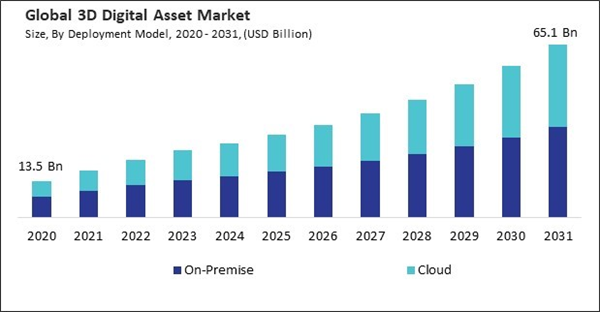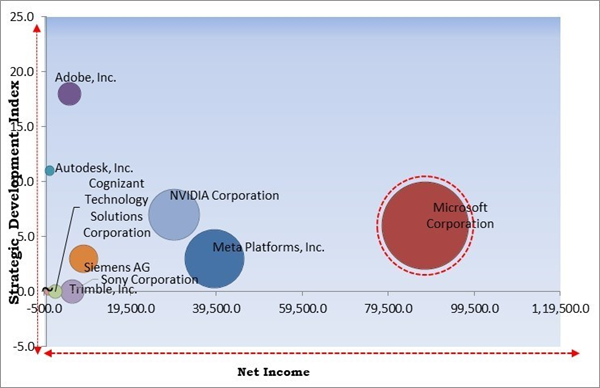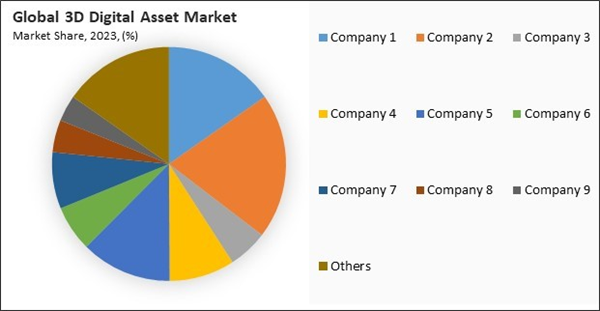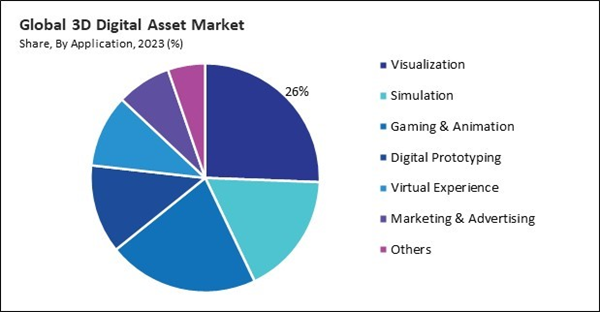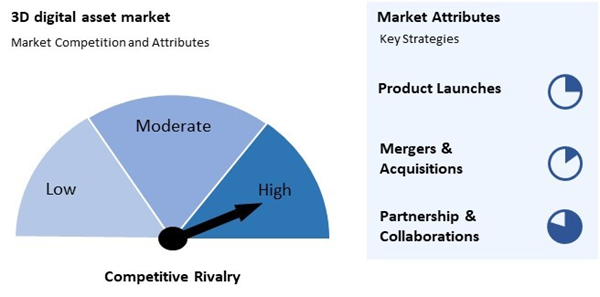Europe’s thriving architectural and automotive sectors and a strong presence in the media and entertainment industry have driven the demand for these assets. Countries like Germany, the UK, and France are at the forefront of adopting 3D technologies in manufacturing, product design, and construction, contributing to the market’s growth in the region. Consequently, the European region would acquire nearly, 28% of the total market share by 2031
The major strategies followed by the market participants are Partnerships as the key developmental strategy to keep pace with the changing demands of end users. For instance, Two news of any two random companies apart from leaders and key innovators. In July, 2024, WPP has partnered with NVIDIA to utilize generative AI for creating detailed 3D ads from simple text prompts. This collaboration, tested with Coca-Cola and Ford, aims to streamline creative processes, enhance in-house production, and adhere to brand guidelines efficiently. Moreover, in February, 2024, Autodesk and Cadence have announced a partnership to integrate Cadence Allegro X and OrCAD X with Autodesk Fusion. This integration enhances PCB design and 3D modeling workflows, offering improved collaboration, precision, and efficiency, and setting new industry standards.
KBV Cardinal Matrix - Market Competition Analysis
Based on the Analysis presented in the KBV Cardinal matrix; Microsoft Corporation. are the forerunners in the Market. In April, 2022, Microsoft and Unity announced a strategic partnership, designating Azure as Unity's preferred cloud provider for real-time 3D (RT3D) experiences. This collaboration will enhance the creation and deployment of 3D content, facilitating seamless publishing to Xbox and PC while leveraging Azure's scalable and secure cloud infrastructure. Companies such as Adobe, Inc. and Autodesk, Inc. are some of the key innovators in Market.
Market Growth Factors
Non-fungible tokens (NFTs) are unique, verifiable digital ownership certificates for virtual items and have become popular in recent years. The development of the metaverse, a collective virtual shared space that incorporates augmented reality, virtual reality, and blockchain, further amplifies the demand for these assets. Hence, the popularity of NFT and metaverse drives the market's growth.Technological advancements and the growing prevalence of mobile and online gaming have driven remarkable growth in the global gaming industry. The market is also significantly influenced by mobile gaming, which has experienced exponential growth in popularity as a result of the pervasive use of smartphones and tablets. Thus, as gaming continues to grow and evolve technologically and culturally, the need for innovative and high-quality assets will continue to rise, propelling the market forward.
Market Restraining Factors
Producing high-quality, lifelike 3D models involves substantial financial investment, which can be prohibitive for many businesses, particularly small and medium-sized enterprises (SMEs) and independent creators. Moreover, the expertise needed to create high-quality 3D models is not easily accessible. The specialized nature of the work of skilled 3D artists, animators, and technical directors results in their commanding high salaries. Hence, the significant financial investment required for high-quality 3D content creation is one of the primary factors hindering the growth of the market.The leading players in the market are competing with diverse innovative offerings to remain competitive in the market. The above illustration shows the percentage of revenue shared by some of the leading companies in the market. The leading players of the market are adopting various strategies in order to cater demand coming from the different industries. The key developmental strategies in the market are Partnerships & Collaborations.
Driving and Restraining Factors
Drivers
- Growing popularity of NFTs and the metaverse
- Expansion of the gaming industry
- Integration of 3D content in advertising and marketing
Restraints
- High costs of 3D content creation
- Lack of standardization in file formats, platforms, and tools
Opportunities
- Evolving demand in architecture and real estate
- Globalization and the expansion of creative industries
Challenges
- Limited accessibility for non-technical users
- Data privacy and security concerns
Application Outlook
Based on application, the market is divided into visualization, simulation, gaming & animation, digital prototyping, virtual experience, marketing & advertising, and others. The gaming & animation segment procured 21% revenue share in the market in 2023. The rise of next-generation gaming consoles, VR and AR gaming, and the continued growth of streaming services have spurred investments in 3D assets for creating highly realistic characters, environments, and special effects.Deployment Model Outlook
On the basis of deployment model, the market is classified into on-premise and cloud. The cloud segment witnessed 44% revenue share in the market in 2023. The growing adoption of cloud-based solutions is driven by their flexibility, scalability, and cost-efficiency. Industries such as eCommerce, education, and SMEs increasingly use cloud-based platforms to create, store, and share 3D assets.Component Outlook
By component, the market is divided into software, hardware, and services. The services segment procured 36% revenue share in the market in 2023. As businesses across various industries increasingly integrate 3D assets into their operations, the demand for professional services such as consulting, custom asset creation, integration, and technical support has surged.Vertical Outlook
Regional Outlook
Region-wise, the market is analyzed across North America, Europe, Asia Pacific, and LAMEA. The North America segment recorded 39% revenue share in the market in 2023. The presence of advanced industries, game developers, film production studios, and prominent technology companies in the region can be attributed to this dominance.Market Competition and Attributes
The market is highly competitive, driven by advancements in gaming, virtual reality, and metaverse applications. Key players include Autodesk, Adobe, and Unity, alongside numerous specialized platforms. Intense competition focuses on innovation, quality, and ease of use, with increasing demand for customizable, high-quality assets fueling the rivalry.
Recent Strategies Deployed in the Market
- Jul-2024: Meta 3D Gen (3DGen) introduces a state-of-the-art pipeline for generating 3D assets from textual prompts, delivering high-quality shapes and textures in under one minute. Integrating Meta 3D AssetGen and Meta 3D TextureGen, 3DGen excels in prompt fidelity and visual quality.
- May-2024: Autodesk’s Project Bernini introduces a generative AI model that creates functional 3D shapes from diverse inputs like images and text. This research focuses on generating accurate, usable designs for architecture, manufacturing, and entertainment, emphasizing geometric precision and real-world functionality.
- Apr-2024: Autodesk has acquired PointFuse’s technology, which converts point cloud data into segmented 3D mesh models. Integrating PointFuse's capabilities with Autodesk’s ReCap Pro will enhance scan-to-BIM workflows, benefiting building renovation, sustainability, and manufacturing. PointFuse as a standalone app will end in May 2025.
- Mar-2024: NVIDIA Edify introduces advanced 3D generative AI capabilities, enhancing creative control for visual content providers. Shutterstock's early access API allows rapid 3D asset creation, while Getty Images, Adobe, and other platforms integrate Edify for tailored visual solutions and interactive experiences.
- Oct-2023: Adobe unveiled powerful new AI and 3D features in Premiere Pro and After Effects, enhancing productivity with AI-powered tools like Enhance Speech and Text-Based Editing improvements. Frame.io gains enhanced storage capabilities, improving collaboration for creative professionals.
List of Key Companies Profiled
- Adobe, Inc.
- Autodesk, Inc.
- Meta Platforms, Inc. (Meta)
- Microsoft Corporation
- NVIDIA Corporation
- Siemens AG
- Sony Corporation
- Trimble, Inc.
- Unity Software Inc.
- Cognizant Technology Solutions Corporation
Market Report Segmentation
By Application
- Visualization
- Simulation
- Gaming & Animation
- Digital Prototyping
- Virtual Experience
- Marketing & Advertising
- Others
By Deployment Model
- On-Premise
- Cloud
By Component
- Software
- 3D Modeling Software
- 3D Rendering & Visualization Software
- 3D Animation Software
- 3D Scanning Software
- Hardware
- 3D Scanners
- Motion Capture Systems
- Services
- Professional Services
- Managed Services
By Vertical
- Architecture & Construction
- Media & Entertainment
- Manufacturing
- Healthcare & Lifesciences
- Automotive
- Government & Public Sector
- Retail & E-commerce
- Others
By Geography
- North America
- US
- Canada
- Mexico
- Rest of North America
- Europe
- Germany
- UK
- France
- Russia
- Spain
- Italy
- Rest of Europe
- Asia Pacific
- China
- Japan
- India
- South Korea
- Singapore
- Malaysia
- Rest of Asia Pacific
- LAMEA
- Brazil
- Argentina
- UAE
- Saudi Arabia
- South Africa
- Nigeria
- Rest of LAMEA
Table of Contents
Companies Mentioned
- Adobe, Inc.
- Autodesk, Inc.
- Meta Platforms, Inc. (Meta)
- Microsoft Corporation
- NVIDIA Corporation
- Siemens AG
- Sony Corporation
- Trimble, Inc.
- Unity Software Inc.
- Cognizant Technology Solutions Corporation



